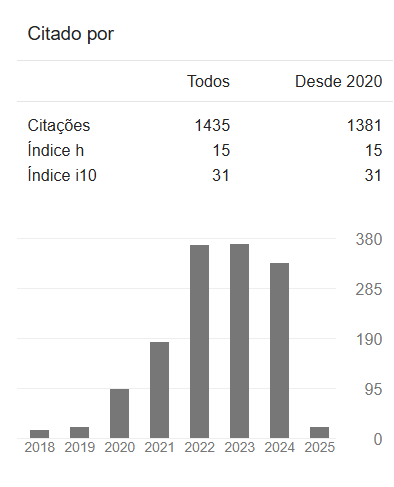RECIPROCAL MOLDING: THE REORGANIZATION OF AN APPLICATION FOR TEACHING GEOMETRY
DOI:
10.23926/RPD.2023.v8.n1.e23037.id1724Keywords:
Mobile devices, Human-Beings-With-Media, Mathematics EducationAbstract
The research discusses the production of an application called GeoRondo for mobile devices to be used as a didactic resource for teaching Spatial Geometry, which was conceptually supported by Dolce and Pompeo (2010) and uses elements of Augmented Reality in the visualization of geometric solids. The objective is based on the analysis of the construction process of the application developed through articulation between a Professor of Mathematics and a Future Computing Professional, intermediated by a Professor of Graduate Studies. The development is based on the Human-Beings-With-Media construct (BORBA, 2001), in which the media permeate the human being in the same way that technologies are impregnated with humanity. The methodology is qualitative linked to the case study with a multidisciplinary triad of subjects. The results show that the tensions that occurred during the process reinforce the idea of Reciprocal Molding, in which a certain media influences the reasoning of those who interact with them and vice versa.
Downloads
Metrics
References
AQUINO, Jayne Cristina Franco de. Educação Infantil e tecnologias digitais: estudo de caso na rede pública de ensino. Dissertação. Universidade Estadual do Rio Grande do Norte. 2021. Disponível em: https://www.uern.br/controledepaginas/ppge-dissertacoes2021/arquivos/62867_dissertaa%E2%80%A1a%C6%92o_jayne_aquino_ppge_uern.p. Acesso em 10 jan. 2021.
BORBA, Marcelo de Carvalho. Tecnologias da informática na educação matemática e reorganização do pensamento. In: BICUDO, Maria Aparecida Viggiani. (org). Pesquisa em educação matemática: concepções e perspectivas. São Paulo: UNESP, 1999.
BORBA, Marcelo de Carvalho. Coletivos seres-humanos-com-mídias e a Produção de matemática. Anais I Simpósio Brasileiro de Psicologia da Educação Matemática da Sociedade Brasileira de Psicologia da Educação Matemática. Curitiba: UFPR, 2001. p.135-146.
BORBA, Marcelo de Carvalho; VILLARREAL, Mónica Ester. Humans-with-media e a reorganização do pensamento matemático: tecnologias de informação e comunicação, modelação, experimentação e visualização. Nova York: Springer; 2005.
BORBA, Marcelo de Carvalho; CHIARI, Aparecida Santana; ALMEIDA, Helber Rangel Formiga Leite. (2018). Interactions in virtual learning environments: New roles for digital technology. Educational Studies in Mathematics, 98, 269–286.
DOLCE, Osvaldo; POMPEO, José Nicolau. Fundamentos de Matemática Elementar: geometria espacial posição e métrica. vol.10, 5ª.ed., São Paulo: Atual ed. 2010.
ENGELBRECHT, Johann.; LLINARES, Salvador.; BORBA, Marcelo de Carvalho. Transformation of the mathematics classroom with the internet. Special issue of ZDM Matematic Education. Springer, 2020. Disponível em: https://link.springer.com/content/pdf/10.1007/s11858-020-01176-4.pdf. Acesso em 15 ago. 2020.
JACON, Liliane da Silva Coelho. Emprego de recursos de hipermídia no processo de ensino aprendizagem: um estudo com capacitação de professores. Dissertação (mestrado em Educação) Programa de pós-graduação stricto sensu em Educação. Universidade do Oeste Paulista. Presidente Prudente, 1998.
JÚNIOR, Neil da Rocha Canedo. A modelagem como uma “atividade” de “seres-humanos-com-mídias”. Dissertação (mestrado profissional em Educação Matemática). Universidade Federal de Juiz de Fora, 2014. Disponível em: https://www2.ufjf.br/mestradoedumat/wpcontent/uploads/sites/134/2011/05/Disserta%C3%A7%C3%A3o-Neil.pdf. Acesso em 20 de mar. 2022.
SACCOL, Amarolinda; SCHLEMMER, Eliane; BARBOSA, Jorge. M-learning e U-learning: novas perspectivas da aprendizagem móvel e ubíqua. São Paulo: Pearson Education, 2010.
SOUTO, Daise Lago Pereira; BORBA, Marcelo de Carvalho. Seres humanos-com-internet ou internet-com-seres humanos: uma troca de papéis?. Revista Latinoamericana de Investigación en Matemática Educativa, 2015. Disponível em: http://www.rc.unesp.br/gpimem/downloads/artigos/souto_borba/seres_humanos_com_internet.pdf. Acesso em 14 de out. 2020.
Downloads
Published
How to Cite
Issue
Section
License
Copyright (c) 2023 A Revista Prática Docente tem o direito de primeira publicação

This work is licensed under a Creative Commons Attribution-NonCommercial 4.0 International License.
Authors who publish in this journal agree to the following terms:
- Authors retain the copyright and grant the journal the right of first publication, with the paper simultaneously licensed under the Licença Creative Commons Attribution allows the sharing of the work with acknowledgment of authorship and initial publication in this journal.
- Authors are authorized to take additional contracts separately, for non-exclusive distribution of the version of the work published in this journal (e.g. publish in institutional repository or as a book chapter), with acknowledgment of authorship and initial publication in this journal.











